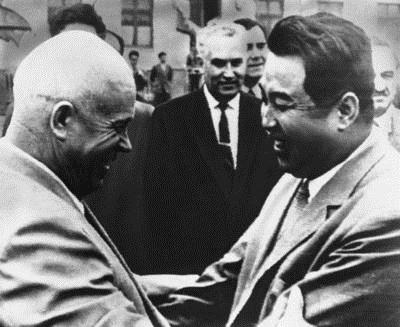After the end of the disastrous Korean War, the Soviet Union continued to help North Koreato rebuild its cities, industry and infrastructure.
Even during the Sino–Soviet ideological split of the 1960s and 1970s, Moscow tried to curry favour with Pyongyang. During the Cold War North Korea successfully managed to squeeze money from both China and the Soviet Union by emphasising its role as a bastion of Communism that directly faced US troops. But when the iron curtain fell in the early 1990s, the democrats in Moscow swiftly recognised Seoul and demanded the payment of debts from Pyongyang.
The timing could not have been worse for North Korea. Most of the country’s capital had been wasted on non-productive sectors, an oversized army, ideological campaigns and extravagant monuments. All that North Korea could offer to Russia as payment-in-kind was a humble list of export goods containing mostly pickles, cigarettes and ginseng-based medicines. Kim Il-sung’s death in 1994 was accompanied by natural disasters and the collapse of industrial and agricultural sectors, which led to 3 million deaths in three consecutive years of famine.
South Korea’s ‘Sunshine Policy’ (1998–2008) and growing humanitarian aid from other regional neighbours permitted North Korea to weather the ‘Arduous March’ ( 고난의 행군 ), and the North started showing some signs of recovery in the early 2000s. It was around this time that Moscow raised the issue of North Korea’s debt, which had already been calculated at nearly US$8 billion. Russian President Vladimir Putin and Chairman Kim Jong-il held two meetings to discuss this and other bilateral issues, creating an impression that the debt would be written off rather than paid in full.
In August 2011, Kim Jong-il and the Russian President Dmitry Medvedev agreed to move forward on a proposal to build a pipeline capable of transporting Russian natural gas to both the North and the South. Simultaneously, North Korea and Russia signed a protocol calling for economic cooperation between the two countries. But international observers immediately questioned the feasibility of such a project in the midst of an ongoing inter-Korean conflict.
For Russia to expect an impoverished North Korea to pay off Soviet-era debt would be unrealistic, as the figure now amounts to US$11 billion. Just recently, the Russian government agreed to discount 90 per cent of the debt owed by its destitute but stubborn ally. The remaining US$1.1 billion is to be invested in joint Russian–North Korean projects, particularly in education, medical and energy sectors.
The timing and generosity of the deal seems surprising. Despite promises of a new era of strength and prosperity, this year saw the DPRK facing old evils: the coldest winter and the driest summer in decades have dashed expectations for a good harvest; the embarrassment of a faulty rocket launch in April was compounded by the withdrawal of US food aid and international condemnation; and hyperinflation and the continuing energy crisis are not propitious signs of effective governance by the newest leader in the Kim dynasty. Is Russia trying to help Kim Jong-un consolidate political power and overcome mounting economic difficulties?
As Vladimir Putin returned to the Russian presidential seat this year, Russia is desperately running out of friends on the international stage. Libya and Syria have already become victims of the ‘Arab Spring’, and Moscow is scrambling to buttress dictatorial regimes in its vicinity. Belarus, Iran, the countries of the Shanghai Cooperation Organisation, and now North Korea, have all received special treatment from an increasingly anti-Western Russia. Anti-Americanism and curtailed political freedoms have again become the primary criteria in gaining sympathy from the Kremlin.
In the recent past, Beijing has been the only power content to sink trillions into North Korea simply to prop up a buffer state ruled by an anachronistic regime. Now Moscow is returning to a Cold War-era East Asia policy by financially supporting a friendly dictator. Moscow is therefore unlikely to fulfil its promise to persuade North Korea to end its nuclear weapons program.
Northeast Asia is again becoming a theatre for large-scale geostrategic games where powerful empires struggle for domination, leaving 75 million Koreans in a state of anxious suspense. Given the current situation, hopes for peace and reconciliation are likely to be disappointed.
Leonid Petrov is Lecturer in Korean Studies at the Faculty of Arts and Social Sciences, University of Sydney.

